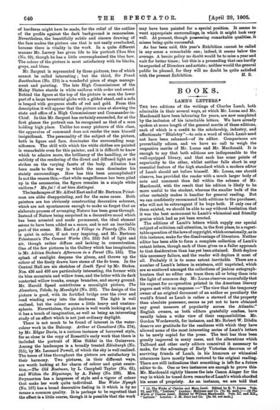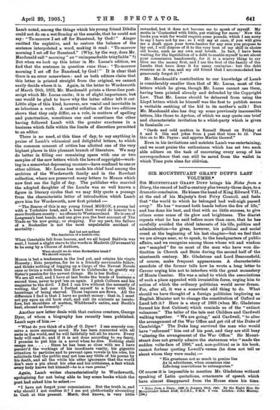BOOKS.
THE two editions of the writings of Charles Lamb, both admirable in their several ways, at which Mr. Lucas and Mr. Macdonald have been labouring for years, are now completed by the inclusion of his inimitable letters. We have already spoken at some length of the general merits of these editions, each of which is a credit to the scholarship, industry, and affectionate " Eliala try "—to coin a word of which Lamb need not have been ashamed—of its editor. Comparisons are proverbially odious, and we have no call to weigh the respective merits of Mr. Lucas and Mr. Macdonald. It is enough to say that both editions are indispensable to the well-equipped library, and that each has some points of superiority to the other, whilst neither falls short in any essential feature of the high standard which a modern editor of Lamb should set before himself. Mr. Lucas, one should observe, has provided the reader with a much larger body of note and comment than fell within the scheme of Mr. Macdonald, with the result that his edition is likely to be more useful to the student, whereas the smaller bulk of the other certainly makes it handier for general reading. But we can confidently recommend both editions to the purchaser, who will not be extravagant if he buys both. If only one of them existed, we should be able to say without hesitation that it was the best monument to Lamb's whimsical and friendly genius which had as yet been erected.
The editions of Lamb's letters which supply our special subject of criticism call attention, in the first place, to a regret- table operation of the laws of copyright, which occasionally, as in this instance, make for the disadvantage of literature. Neither editor has been able to form a complete collection of Lamb's extant letters, though each of them gives us a fuller approach to that desideratum than has yet been attained. Both deplore this necessary failure, and the reader will deplore it most of all. Probably it is to some extent inevitable. There are a number of Lamb's letters in existence, still unprinted, which are so scattered amongst the collections of jealous autograph. hunters that no editor can trace them all or bring them into the light of common day. Mr. Lucas observes mournfully that his request for co-operation printed in the American literary papers met with no response :—" The view that the temporary owner of an original document of an author so peculiarly the world's friend as Lamb is rather a steward of the property than absolute possessor, seems as yet not to have obtained any great measure of popularity across the Atlantic." English owners, as both editors gratefully confess, have usually taken a wider view of their responsibilities. Mr.
Gordon Wordsworth, for instance, and Mr. Robert W. Dibdin deserve our gratitude for the readiness with which they have allowed some of the most interesting series of Lamb's letters to be newly copied for the press. The text has thus been greatly improved in many cases, and the alterations which Talfourd and other early editors conceived it necessary to make, for the advantage of Early Victorian decorum or of surviving friends of Lamb, in his humours or whimsical utterances have mostly been restored to the original reading. There are still indications that something is left for a future editor to do. One or two instances are enough to prove this- Mr. Macdonald rightly blames the late Canon Ainger for the way in which he toned down remarks of Lamb's which shocked his sense of propriety. As an instance, we are told that • (1) The Works of Charles and Mary Lamb. Edited by E. V. LIMB. vols. VI. and VIL, "Letters," London Methuen and Co. [7s. 6d. each.]—(2 711..he Works of Charles Lamb. Edited by William Macdonald. Vols. XI. and1 "Letters." London J. M. Dent and Co. [Ss. 6d. net each.]
Lamb noted, among the things which his young friend Dibdin could not do on a wet Sunday at the seaside, that he could not say : "To-morrow I set off for Banstead, by God!" Ainger omitted the expletive, and to restore the balance of the sentence interpolated a word, making it read : "To-morrow morning I set off for Banstead." (Why, by the way, does Mr. Macdonald call " morning " an "unimpeachable trisyllable " ?) But when we look up this letter in Mr. Lucas's edition, we find that the sentence in question runs thus : "To-morrow morning I set off for Banstead, by God ! " It i8 clear that there is an error somewhere : and as both editors claim that this letter is printed straight from the original, we cannot easily decide where it is. Again, in the letter to Wordsworth of March 20th, 1822, Mr. Macdonald prints a three-line post- script which Mr. Lucas omits; it is of slight importance, but one would be glad to know why the latter editor left it out. Little slips of this kind, however, are venial and inevitable in so laborious a work. A careful collation of the two editions shows that they only differ, as a rule, in matters of spelling and punctuation, sometimes one and sometimes the other having followed Lamb with the greater exactness in a business which falls within the limits of discretion permitted to an editor.
There is no need, at this time of day, to say anything in
praise of Lamb's whimsical and delightful letters, to which the common consent of critics has allotted one of the very highest places in this pleasant branch of literature. We may do better in filling our remaining space with one or two samples of the new letters which the laws of copyright—work- ing in a somewhat depressing manner—have confined to one or other edition. Mr. Lucas has made his chief haul among the archives of the Wordsworth family and in the Rowfant collection, where are preserved many letters to Moron which now first see the light of day. The publisher who married the adopted daughter of the Lambs was so well known a figure in literary circles that we may fitly quote a passage from the characteristic letter of introduction which Lamb gave him for Wordsworth, now first printed :— "The Bearer of this is my young friend MOXON, a young lad with a Yorkshire head, and a heart that would do honour to a more Southern county : no offence to Westmoreland. He is one of Longman's best hands, and can give you the best account of The Trade as 'tie now going; or stopping. For my part, the failure of a Bookseller is not the most unpalatable accident of
mortality :
Sad but not saddest The desolation of a hostile city.
When Constable fell from heaven, and we all hoped Baldwin was next, I tuned a slight stave to the words in Macbeth (D'avenant's) to be sung by a Chorus of Authors,
What should we do when Booksellers break P We should rejoyce.
Moron is but a tradesman in the bud yet, and retains his virgin Honesty ; Esto perpetua, for he is a friendly serviceable fellow, and thinks nothing of lugging up a Cargo of the Newest Novels once or twice a week from the Row to Colebrooke to gratify my
Sister's passion for the newest things. He is her Bodley We are all well, and I have at last broke the bonds of business a second time, never to put 'em on again. I pitch Colburn and his magazine to the divil. I find I can live without the necessity of writing, tho' last year I fretted myself to a fever with the hauntings of being starved. Those vapours are flown. All the difference I find is that I have no pocket money : that is, I must not pry upon an old book stall, and cull its contents as hereto- fore, but shoulders of mutton, Whitbread's entire, and Booth's best, abound as formerly."
Another new letter deals with that curious creature, George Dyer, of whom a biography has recently been published. Lamb says of him:— •
"What do you think of a life of G. Dyer ? I can scarcely con- ceive a more amusing novel. He has been connected with all sects in the world, and he will faithfully tell all he knows. Every body will read it ; and if it is not done according to my fancy, I promise to put him in a novel when he dies. Nothing shall escape me Since he has been so close with me I have perceiv'd the workings of his inordinate vanity, his gigantic attention to particles and to prevent open vowels in his odes, his solicitude that the public may not lose any tittle of his poems by his death, and all the while his utter ignorance that the world don't care a pin about his odes and his criticisms, a fact which every body knows but himself—he is a rum genius."
Again, Lamb writes characteristically to Wordsworth, apologising for not being able to buy some books -which the poet had asked him to select:— "I have not forgot your commissions. But the truth is, and why should I not confess it ? I am not plethorically abounding in Cash at this present. Merit. God knows, is very little rewarded, but it does not become me to speak of myself. - My motto is 'Contented with little, yet wishing for more.' Now the books you wish for would require some pounds, which I am sorry to say I have not by me : so I will say at once, if you will give me a draft upon your town-banker for any sum you propose to lay out, I will dispose of it to the very best of my skill in choice old books, such as my own soul loveth. In fact, I have been waiting for the liquidation of a debt to enable myself to set about your commission handsomely, for it is a scurvy thing to cry Give me the money first, and I am the first of the family of the Lambs that have done it for many centuries : but the debt remains as it was, and my old friend that I accommodated has generously forgot it !"
Mr. Macdonald's contribution to our knowledge of Lamb is considerably smaller than that of Mr. Lucas, most of the letters which he gives, though Mr. Lucas cannot use them, having been printed already and defended by the Copyright Law. That Mr. Lucas should be debarred from using the
Lloyd letters which he himself was the first to publish seems a veritable seething of the kid in its mother's milk ! But Mr. Macdonald also has dug up some previously inaccessible letters, like those to Ayrton, of which we may quote one brief and characteristic invitation to a whist-party which is given in facsimile :— "Cards and cold mutton in Russell Street on Friday at 8 and 9. Gin and jokes from 4 past that time to 12. Pass this on to Mr. Payne : and apprize Martin thereof."
Even in his invitations and notelets Lamb was entertaining, and we must praise the enthusiasm which has set two such able editors on the task of recovering every scrap of his correspondence that can still be saved from the wallet in which Time puts alms for oblivion.



















































 Previous page
Previous page